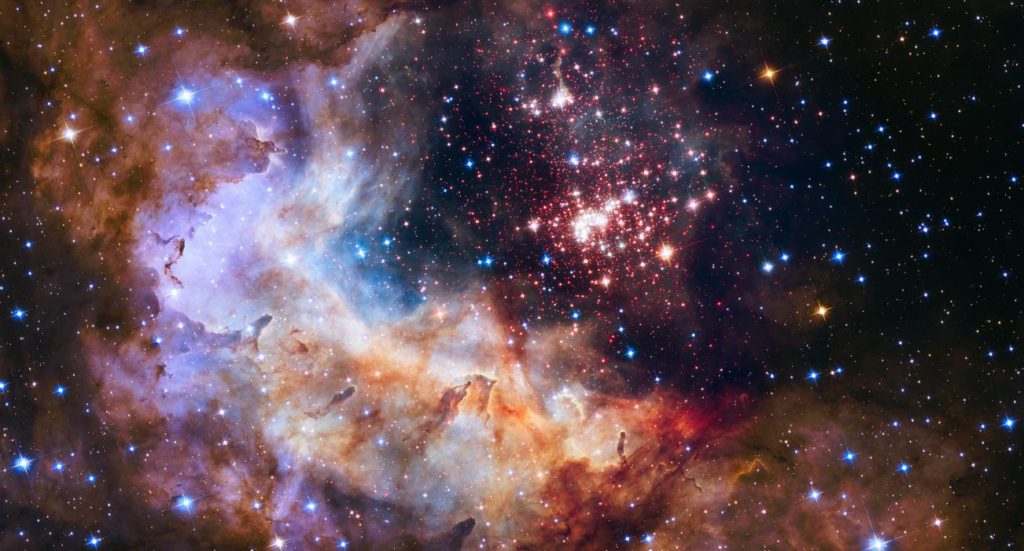Does God Exist? A Look at the Cosmological Argument

Introduction
When was the last time you marveled over something incredibly beautiful? Perhaps it was a stunning landscape, a breathtaking sunset, the stars, or an amazing animal of some kind.
Have you ever seriously pondered how everything could have possibly gotten here? We’ve all considered this question in one form or another, haven’t we? After all, it is one of the biggest questions in life.
German philosopher G. W. Leibniz (1646-1716) put it this way: “Why is there something rather than nothing?”[1] In other words, why does anything exist at all?
We have answers to these questions in the Kalam Cosmological Argument for the existence of God. The word “cosmological” comes from “cosmos” (universe) and “logos” (reason for),[2] and it goes like this:
- Whatever begins to exist has a cause.
- The universe began to exist.
- Therefore the universe has a cause.
Whatever begins to exist has a cause
To support our first premise, we draw on one of the most basic principles of science, the law of Causality. It states that every material effect (anything that had a beginning) must have had an adequate antecedent or simultaneous cause. Simply put, whatever had a beginning must have had a cause.
If you suddenly heard a loud bang from another room in your house, you would be alarmed and want to know what caused it. If you found piece of paper lying on the floor in that room you would reject that as the cause and keep on looking. The cause needs to be adequate.
Nothing comes from nothing. And nothing can cause itself. Even the great skeptic David Hume said, “I never asserted so absurd a proposition as that anything might arise without a cause.”[3]
The universe began to exist
That the universe had a beginning is now an established fact among scientists.
The beginning of time
Philosophers have been telling us for centuries that the universe cannot possibly have always existed. It is impossible to travel to the end an infinite series of moments in time. Yet we are here today. Therefore, it is absurd to believe that time stretches back into the infinite past. There must have been a beginning to time itself.
The Laws of Thermodynamics
The Second Law of Thermodynamics, discovered in the mid-1800s, tells us that the universe is heading towards a state of thermal equilibrium.
If the universe had always existed since the infinite past, it would have run out of all usable energy a long time ago, and there would be an even distribution of heat throughout the universe. This is called “heat death.”
Evidence of expansion
Albert Einstein’s 1915 theory of General Relativity suggested that the universe might be expanding. Then in 1929 astronomer Edwin Hubble observed the red shift of distant galaxies, and explained that it meant the galaxies are moving away from us. It is the same principle as the way a train whistle changes pitch as it passes by. He concluded that the universe is literally flying apart at enormous velocities.[4]
If the universe is expanding, then if we go backwards in time it would shrink down to a single point of origin. This point is called the Singularity. The volume of the universe approaches zero as the density, temperature, and pressure all approach infinity.
Astronomer Fred Hoyle sarcastically called this beginning of the Universe the “Big Bang” and the name stuck. During a BBC radio broadcast in 1949, he said, “These theories were based on the hypothesis that all the matter in the universe was created in one big bang at a particular time in the remote past.”[5]
Atheist physicist Stephen Hawking has said, “almost everyone now believes that the universe, and time itself, had a beginning at the Big Bang.”[6]
Therefore the universe has a cause
The implications are profound, because whatever created the universe is now beyond the reach of science. Consider that science is a study of the natural realm. That means science is confined inside the universe. But the cause is outside the universe because the universe cannot create itself.
Astronomer Robert Jastrow, an agnostic, was the founder and director of NASA’s Goddard Institute of Space Studies. He described the situation this way:
“Astronomers now find they have painted themselves into a corner because they have proven, by their own methods, that the world began abruptly in an act of creation to which you can trace the seeds of every star, every planet, every living thing in this cosmos and on the earth. And they have found that all this happened as a product of forces they cannot hope to discover… That there are what I or anyone would call supernatural forces at work is now, I think, a scientifically proven fact.”[7]
The natural sciences by definition can’t investigate the supernatural. For the atheist then, the cause of the universe is now a matter of faith. The question is, is it a blind faith or a reasonable faith? Where does the evidence lead?
Where does the evidence lead?
We can reasonably determine what some of the characteristics of the cause must be based on what we do know. We logically follow where the evidence leads. The cause must be:
- Timeless, since it created time. It would have no beginning in time, so it would be uncaused and eternal.
- Non-physical, since it created all matter.
- Non-spatial and without limits, since it is outside the spatial universe.
- Incredibly powerful, since it created the entire universe.
- Personal. The act of creating the universe meant a decision point. This requires a conscious, thinking being with a will to act.
Could this be God?
This is starting to look a lot like the God of the Bible. But notice we haven’t used the Bible at all to get here. We have only used science and reasonable thinking.
But if we do go to the Bible, consider what we find. God is eternal (Psalm 90:2), spirit (John 4:24), without limit (Psalm 139:7-10), all powerful (1 Chronicles 29:11-12), and personal (Genesis 1:27).
Robert Jastrow, again, offers a somewhat humorous but thoughtful conclusion:
“For the scientist who has lived by his faith in the power of reason, the story ends like a bad dream. He has scaled the mountains of ignorance: he is about to conquer the highest peak; as he pulls himself over the final rock, he is greeted by a band of theologians who have been sitting there for centuries.”[8]
Israel’s King David who lived 3000 years ago wrote, “The heavens proclaim the glory of God. The skies display his craftsmanship. Day after day they continue to speak; night after night they make him known.” (Psalm 19:1-2).
We’ve all been struck by that incredibly beautiful something. And we’ve all asked how everything could have possibly gotten here. Have you decided what you will believe?

Be sure to watch this excellent animated video.
[1]Leibniz, “Nature and Grace,” in Selections, 527, quoted in William Lane Craig, Reasonable Faith: Christian Truth and Apologetics 3rd. Ed. (Wheaton, IL: Crossway, 2008), 99.
[2]Norman L. Geisler, 12 Points That Show Christianity Is True (Indian Trail, NC: NGIM Ministries), 25.
[3]David Hume, in J. Y. T. Greig, ed., The Letters of David Hume, 2 Vols. (New York: Garland, 1983), 1:187.
[4]Lee Strobel, The Case For a Creator (Grand Rapids, MI: Zondervan, 2004), 105.
[5]Ibid., 105, emphasis added.
[6]Stephen W. Hawking and Roger Penrose, The Nature of Space and Time (Princeton, N.J.: Princeton University Press, 1996), 20; cited in Strobel, Case for a Creator, 105.
[7]“A Scientist Caught Between Two Faiths: Interview with Robert Jastrow,” Christianity Today, August 6, 1982; cited in Norman Geisler and Frank Turek, I Don’t Have Enough Faith to Be an Atheist (Wheaton, IL: Crossway, 2004), 84-85.
[8]Robert Jastrow, God and the Astronomers(New York: WW. Norton, 1978), 116; cited in Steve Kumar and Jonathan Sarfati, Christianity for Skeptics (Powder Springs, GA: CMI, 2013), 21.
WOW! What a huge amount of study it took to write this. I must read it several times to really understand it all. This is a very logical explanation of how the universe and everything else began.